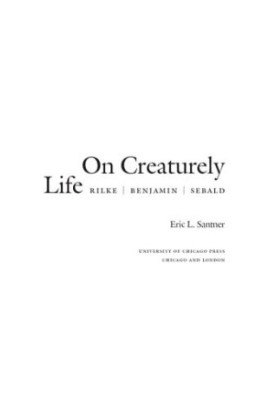On creaturely life: Rilke, Benjamin, Sebald
 Instant download
Instant download
after payment (24/7)
 Wide range of formats
Wide range of formats
(for all gadgets)
 Full book
Full book
(including for Apple and Android)
In his Duino Elegies, Rainer Maria Rilke suggests that animals enjoy direct access to a realm of being—the open—concealed from humans by the workings of consciousness and self-consciousness. In his own reading of Rilke, Martin Heidegger reclaims the open as the proper domain of human existence but suggests that human life remains haunted by vestiges of an animal-like relation to its surroundings. Walter Benjamin, in turn, was to show that such vestiges—what Eric Santner calls the creaturely—have a biopolitical aspect: they are linked to the processes that inscribe life in the realm of power and authority. Santner traces this theme of creaturely life from its poetic and philosophical beginnings in the first half of the twentieth century to the writings of the enigmatic German novelist W. G. Sebald. Sebald’s entire oeuvre, Santner argues, can be seen as an archive of creaturely life. For Sebald, the work on such an archive was inseparable from his understanding of what it means to engage ethically with another person’s history and pain, an engagement that transforms us from indifferent individuals into neighbors. An indispensable book for students of Sebald, On Creaturely Life is also a significant contribution to critical theory.
LF/886420/R
Data sheet
- Name of the Author
- Benjamin
Eric L.
Rainer Maria
Rilke
Santner
Sebald
Walter
Winfried Georg - Language
- English
- ISBN
- 9780226735054
- Release date
- 2006











![[Fearless Jones 01] •...](https://lionbook.net/1514947-thickbox_default/-fearless-jones-01-fearless-jones.jpg)














